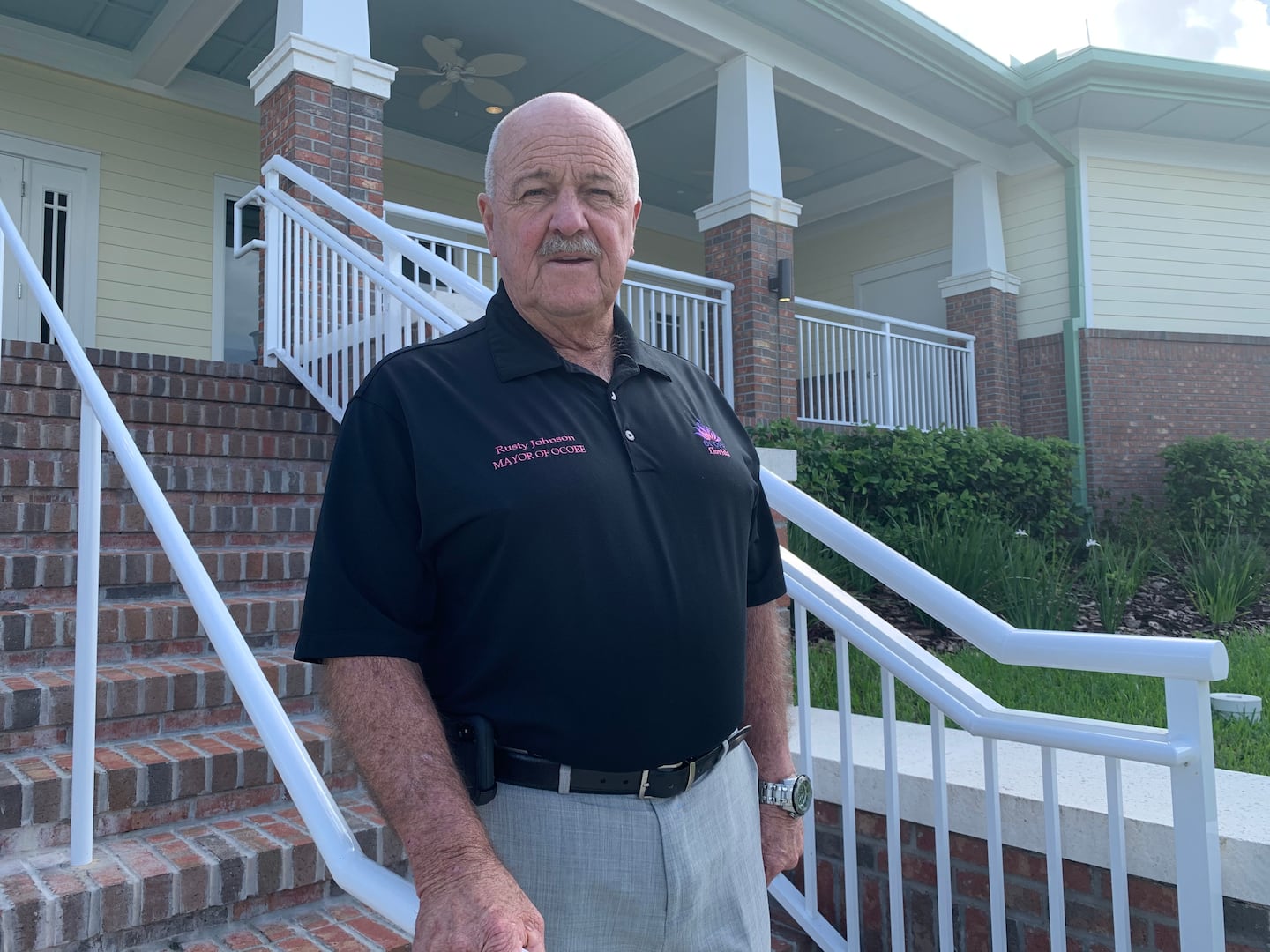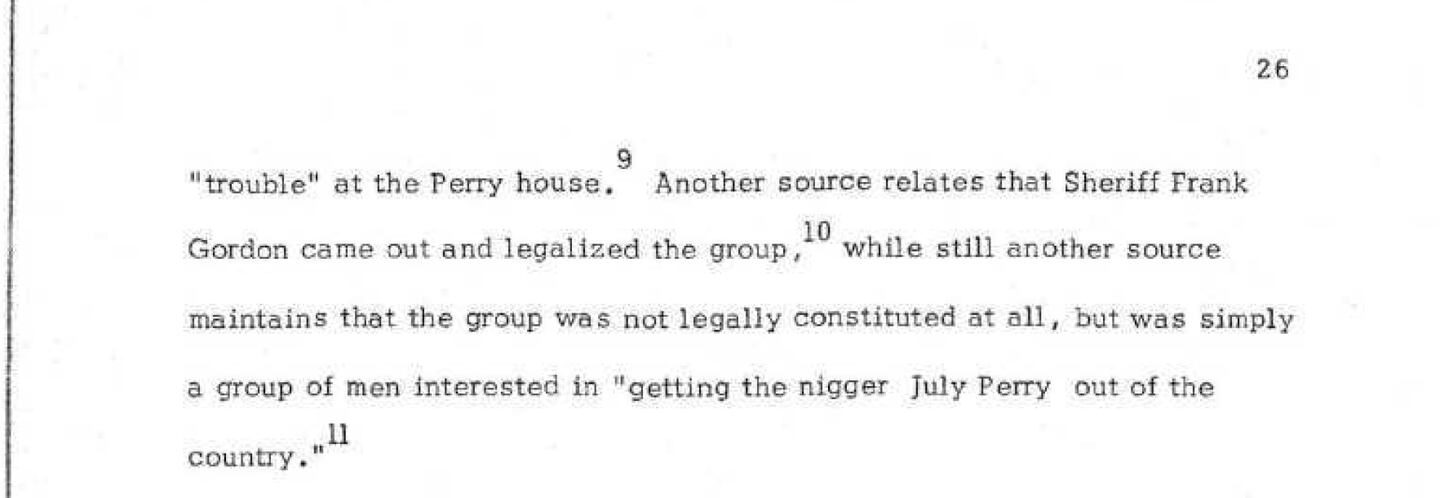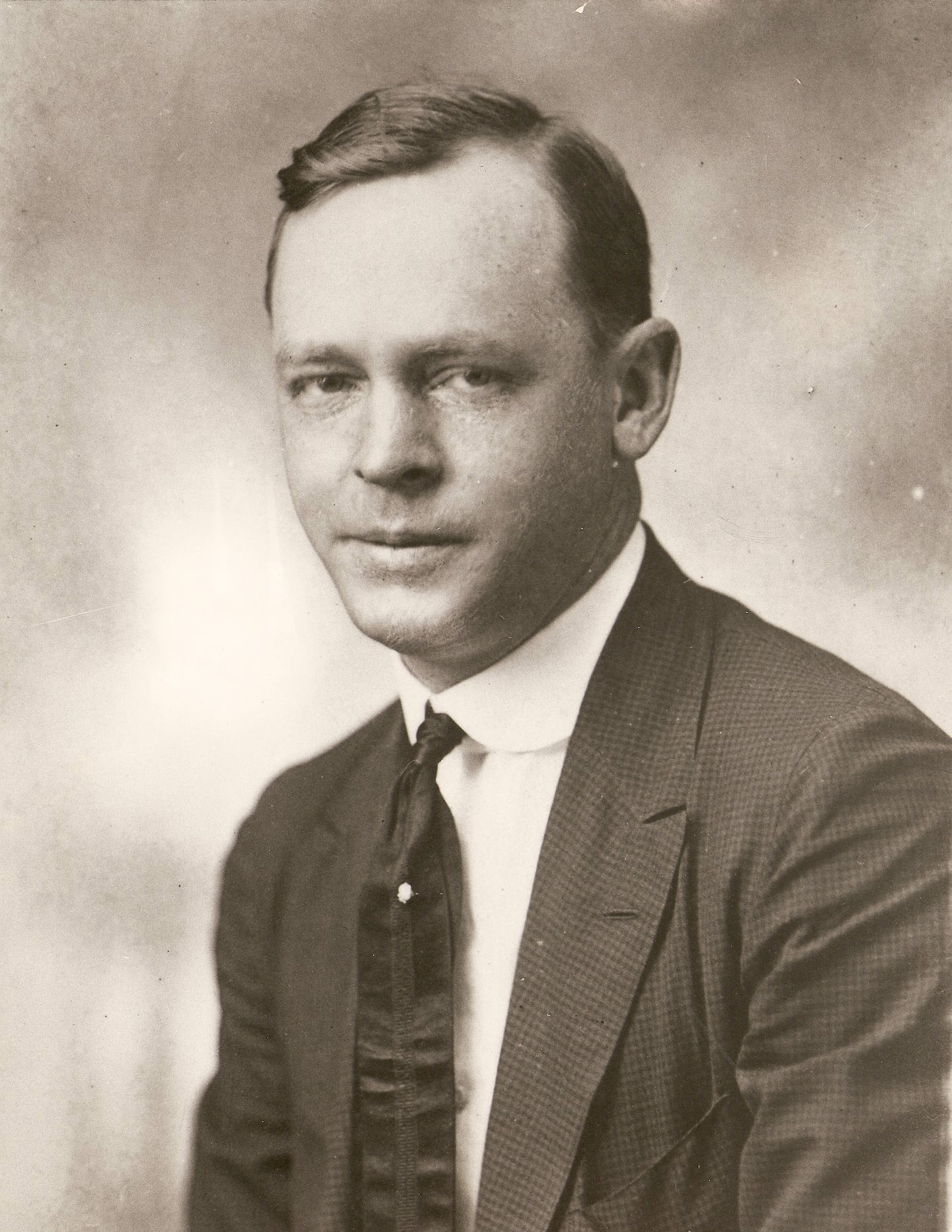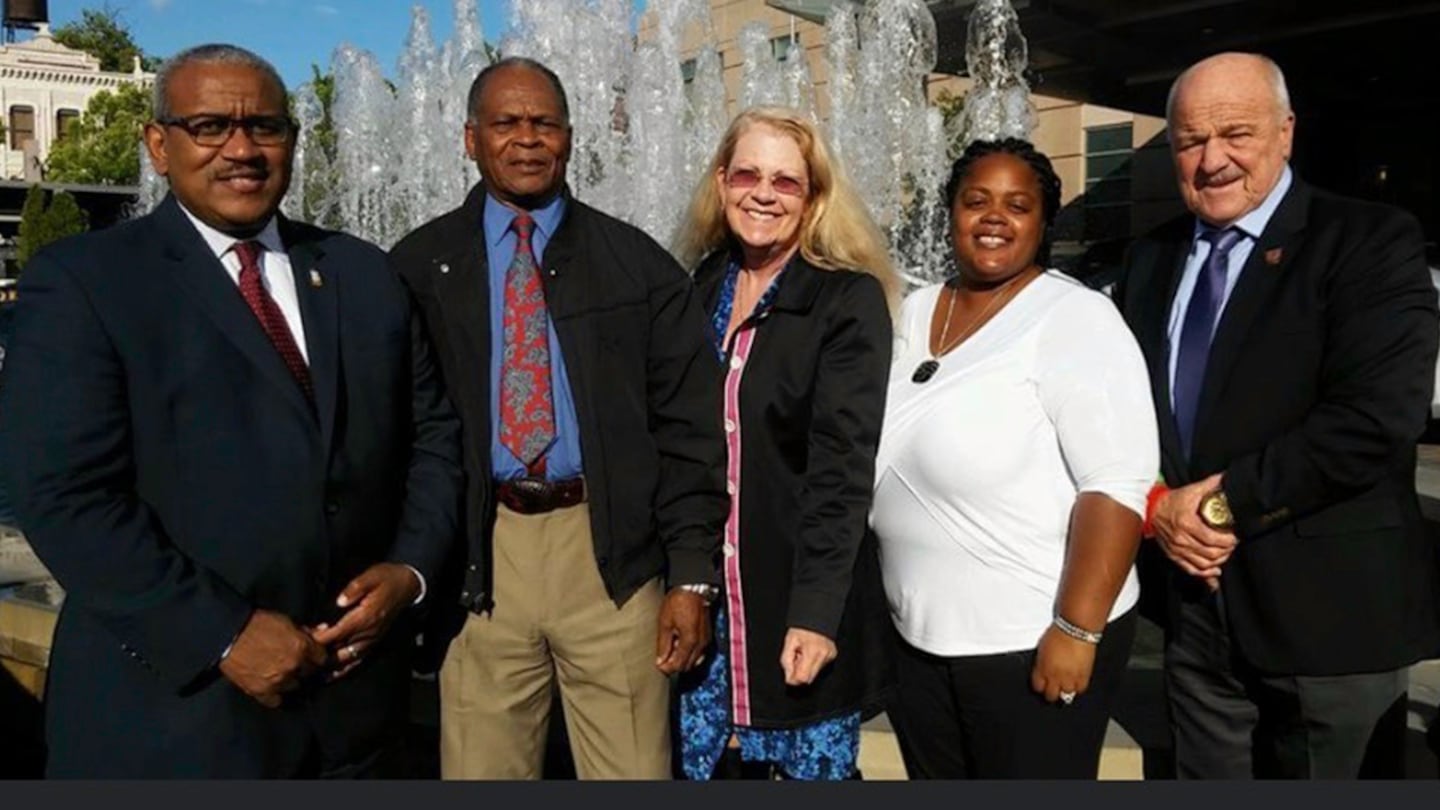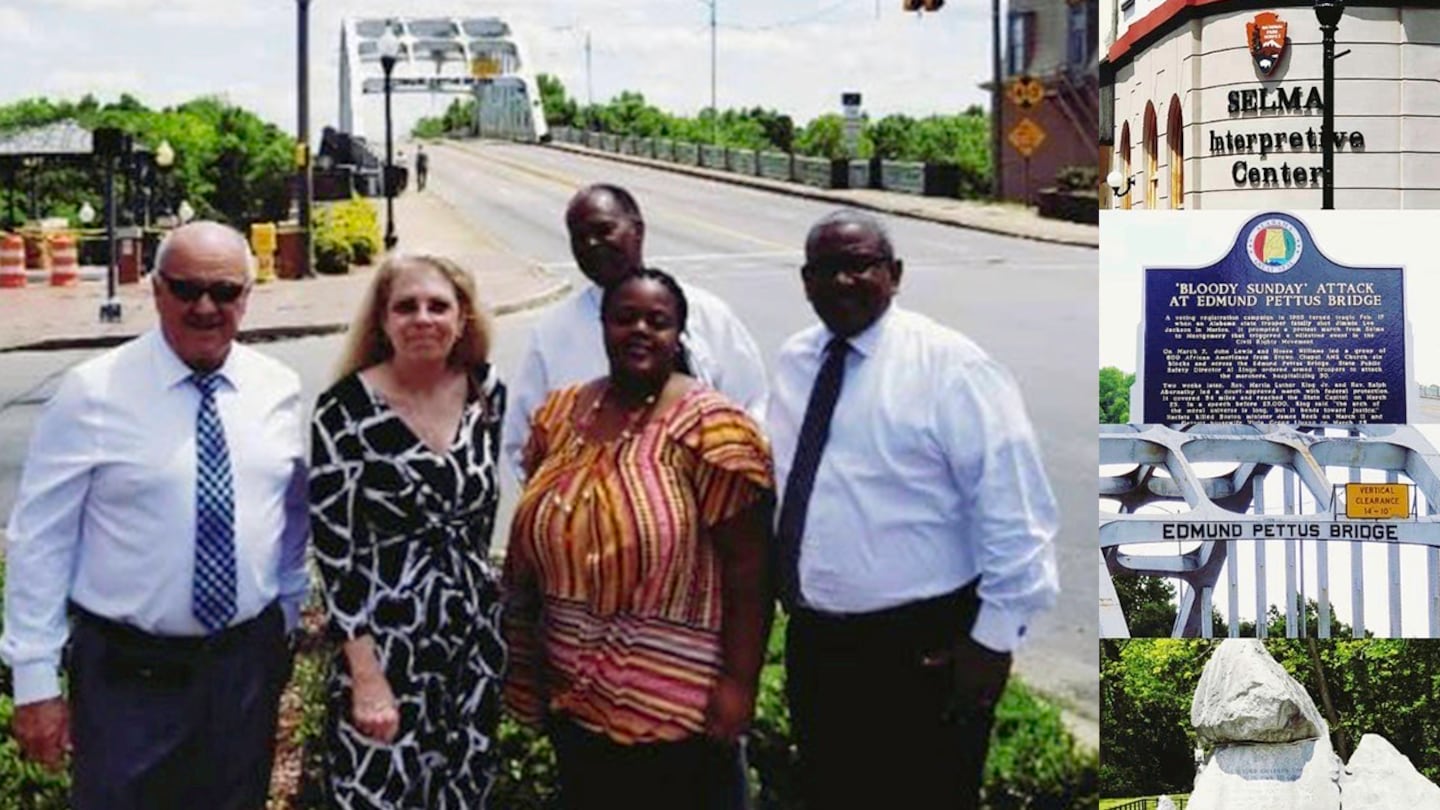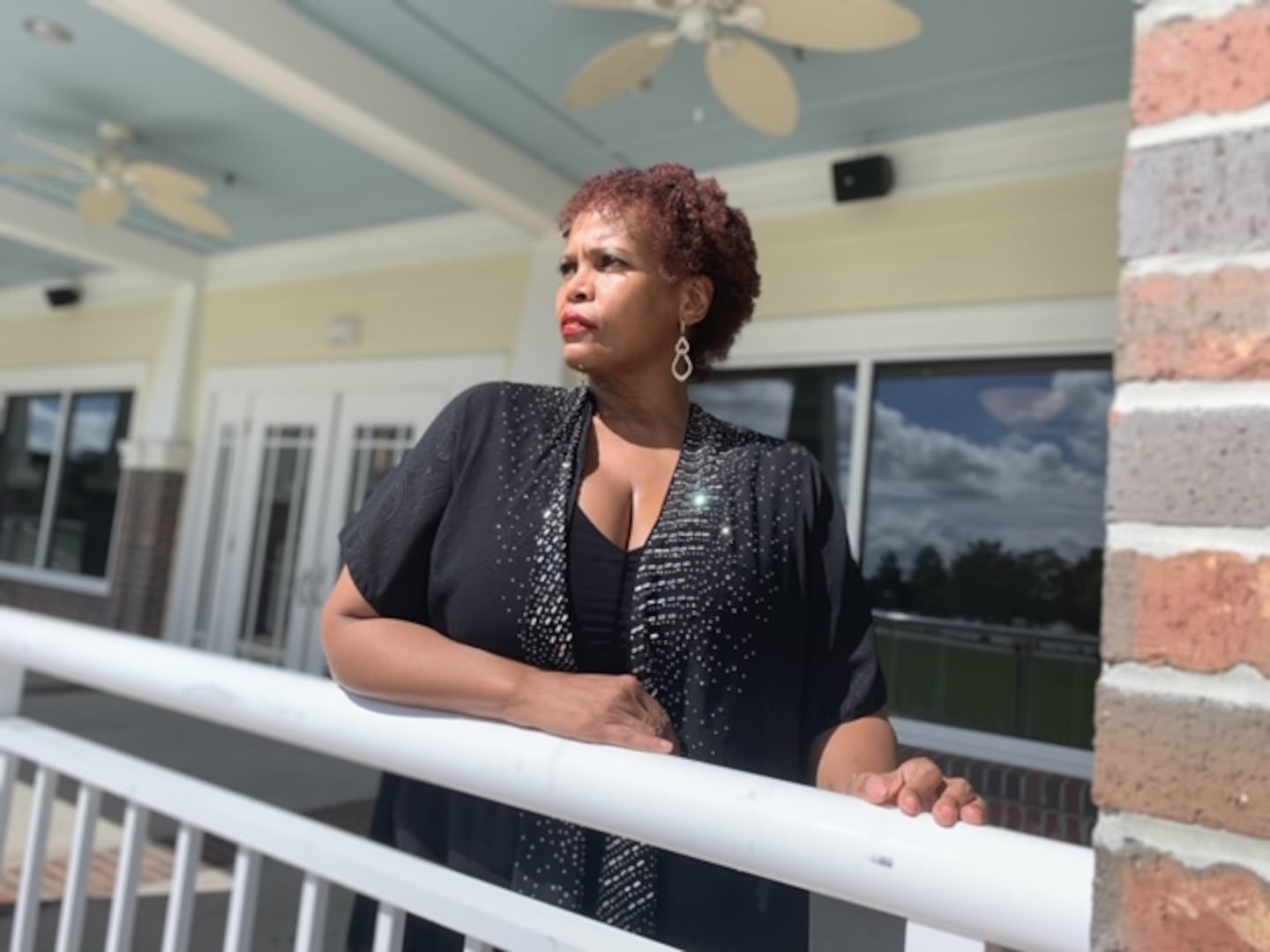On a warm day, Ocoee Mayor Rusty Johnson and his wife, Marilyn, met us at the Lakeshore Community Center, along Starke Lake. The location of the meeting was fitting and intentional. The lake and its beauty were prime for opportunity for early settlers, and it is where the city’s founder, J.D. Starke, in the mid-1850′s, would create a community.
Ocoee’s vast growth could’ve never been imagined back then. Starke traveled to the area with slaves in tow, hoping to escape a malaria outbreak, establishing a labor camp where slaves worked. Word spread, quickly, about the opportunity available in Florida, luring Blacks and whites alike from places like Georgia and South Carolina.
That thirst for opportunity, equality and freedom, would later lead to the Ocoee Massacre. The result - bloodshed – two whites killed and an untold number of Blacks. The Black land was destroyed by fires set by angry white mobs, some of them outsiders from cities like Orlando, Jacksonville, other states. Ultimately, Blacks were forced out of the community, where they too had settled for opportunity.
Getting to Ocoee
It took three months to get Mayor Rusty Johnson to Starke Lake. He wanted no part of the story of the Ocoee Massacre, even a century later. He referred to WFTV’s attempts to tell the story as a push by “outsiders trying to dig up dirt.”
Johnson is under pressure from several fronts. He has faced criticism for the city’s long-time failure to fully acknowledge, apologize for and properly commemorate the single bloodiest day in modern American political history, leaving a community without closure, a century later. Mayor Johnson has served the city he has called home since 1955, for 34 years, as either city commissioner or Mayor. His son, too, now works as the director of Parks and Recreation.
Ocoee is his home.
“We moved to Oakland when we first got here in 1955 and my father would come home and then I guess my uncle lived in Ocoee and they said, ‘We’re going to move to Ocoee.’”
The family came here from South Carolina, where Johnson’s father was the supervisor of a chain gang. Johnson said he would’ve been 9-years-old at the time.
“There was no diversity in this city.”
— Mayor Rusty Johnson
“If you look across the lake, there was a yellow house, and we lived in that house when we moved here in 1955 and she sold my father four lots up on 16th Street, which was $500 a lot …and that’s how we got here,” he said as we sat in a room with a clear view of Starke Lake.
At that time, Blacks were already referring to Ocoee as a Sundown Town, an all-white community where Blacks knew they weren’t welcome. And they knew for sure they’d better not be caught in town after the sun went down. It could be the difference between life or death.
“There was no diversity in this city,” Johnson said. “No, I went to high school with all, all of us were Caucasian, no diversity.” He recalls attending football and baseball games, where he watched all white players on the field. “Winter Garden had a Black school, high school band, it was (an) all Black school. You never thought much about it," Johnson said.
Despite the overall diversity, in his all-white community, Johnson said he never heard people use disparaging comments about Blacks, though he later describes encounters when some would make “off handed” comments about “somebody being of color.” And Johnson said once when he was walking with his best friend after President John F. Kenney was killed, he heard it.
"I was coming out of the building and I’m walking with my best friend … it came over the loudspeaker and he said, “'I’m glad that N***** lover is dead.' See that to me, that I didn’t like,” Johnson said.
The Thesis of Lester Dabbs
Lester Dabbs is someone Johnson knew, during those days at high school.
Dabbs taught at the original Ocoee High School and was the first principal at West Orange High School when it opened in 1976. He was also a commissioner for three years and elected Mayor after in 1989, until he started “stirring up trouble.”
“They wanted to hang him. I mean, they didn’t want to vote for him. He got beat because of his vision of what things should be,” Johnson recalled.
Marilyn Johnson, Mayor Johnson’s wife, also remembers Dabbs well.
“Lester was a very big civil rights activist. And there were people telling them they didn’t want that. You know and so they didn’t like him, but I don’t find that now,” Marilyn Johnson said. “Most of those people are dead and gone.”
Marilyn Johnson’s maiden name is Pounds. Her father owned a long-time pharmacy in town, where he often forgave customer tabs. His father was Clyde Pounds, a local deputy sheriff.
Dabbs wrote an academic these focusing on first-hand accounts of those who participated in the massacre. Dabbs quoted a number of anonymous sources in his thesis, but some descriptions of sources allowed us to discern who provided him with certain accounts of the history. According to his research, Clyde Pounds deputized some 20 men to go to Julius ‘July’ Perry’s home after Blacks in Ocoee tried to vote in the Nov. 2, 1920 election.
Mayor Johnson said Dabbs was the first to talk to him about the 1920 Ocoee Massacre and he read about it in Dabbs' thesis, published in 1969. But Johnson insisted he wasn’t aware of his wife’s grandfather’s connection until shortly before he agreed to speak with Investigative Reporter and Executive Producer of the Ocoee Massacre story, Daralene Jones, in mid-September.
“Never heard a word about it until a little while ago and read one of the reports,” he said. “And I told you I read one today where Sheriff Moore, he was a constable or deputy sheriff. I don’t even know what it was.”
“Mr. Dabbs and the rest of them, the things I learned, that was never brought up,” Johnson continued, “I know what kind of man Edwin Pounds was. He was one of the most kind-hearted generous people that you’d ever meet.”
“Using the words racist cause his father did that. He was a racist, then his daughter is a racist, being I was married to her, I was a racist, it makes me hurt inside.” Johnson stated. Marilyn Johnson said there wasn’t a word spoken about it from her parents, either. Johnson was referring to social media posts in which he and his wife have been referred to as racist because of how he berated a standing state Senator during a city council meeting during discussions about how to best commemorate the Ocoee Massacre, approaching the 100th anniversary.
Democracy Forum gets involved
In the late 90s, when the Democracy Forum were first to start work to seek answers about the Ocoee Massacre, they were dismissed by then Mayor Scott Vandergrift and descendants of the perpetrators, who shouted them down during an event at Barnes and Noble. The grassroots organization was started after a man named Curtis Michelson helped Otis Mccaster a job at a radio station in Ocoee, who quite after three consecutive nights of a police officer following him.
“Otis had such a great radio voice,” said Democracy Forum member Francina Boykin. “Going to the radio station, you had to drive through an orange grove and just picture yourself driving in the darkness to this radio station …so Otis said after the third night, he says, I’m not going back to Ocoee. He said, ‘Ocoee, is not a place for a brother,’” Boykin recounts.
“It turned out to be good trouble.”
— Francina Boykin
The Democracy Forum members volunteered their time researching the details surrounding the Ocoee Massacre, unearthing Perry’s original death certificate, piecing together the story using old newspaper articles, interviews with descendants who were speaking about the atrocity for the first time, and public records that hadn’t been purged.
Boykin remembers the day well. They had organized a series of community forums to discuss the massacre. One such event would be held at the Ocoee Borders bookstore, now shuttered, at the West Oaks Mall. The location had once been an attraction for Black residents who would reluctantly move to Ocoee after the massacre. Then Mayor Scott Vandergrift had tried to bully the manager of the store into canceling the event, she said. “I thought it would be a time to help the community heal.”
Vandergrift and other white descendants belittled members of the Forum, according to local newspaper accounts.
They weren’t deterred. The group’s research led to July Perry’s original death certificate. They were first to locate his grave at Greenwood Cemetery in Orlando. They found the man who was lynched over his right to vote, buried in an unmarked pauper’s grave in a city he never called home. Later, the West Orange Reconciliation Task Force located Perry’s family and added a headstone.
“22 years ago, I stood nervously at the podium in Borders, the first up to speak, with a group of finger-pointing Ocoee citizens threatening Democracy Forum of being outsiders and troublemakers. It turned out to be good trouble,” stated Boykin. “Ocoee stepped up to the plate, and like baseball, it was ‘batter up’, and here we are today,” said Boykin.
Trying to ‘Dig Up Dirt’
As a journalist and resident of Ocoee, on a mission to provide an accounting of the history of Ocoee, including what led to the massacre, where the city is now and the progress that still needs to be made, I would find myself on the other end of that finger-pointing – 22 years later.
Mayor Johnson was first elected in 1985 to serve on the city commission. In 2015, he became mayor after long-time Mayor Scott Vandergrift retired. The city has grown, and businesses have come to town, but Johnson has faced verbal challenges during commission meetings.
Initial requests to speak with Mayor Johnson were denied. In telephone conversations he described the efforts to tell the story as a push by outsiders trying to, “dig up dirt.” It would take months to convince him, and it was a member of the Human Relations Diversity Board, Bill Maxwell, who would facilitate the final ask.
In 2018, Maxwell and others on the HRDB worked with the first and newly elected Black commissioner, George Oliver, to step forward and acknowledge the Ocoee Massacre with a proclamation. The city also sponsored a trip to Montgomery, Alabama, for some board members to attend the opening of the National Memorial for Peace and Justice. It features a memorial for Blacks who were hanged, burned alive, drowned or beaten from the later 1800s to 1950.
One of the markers is dedicated to the victims of Orange County, Florida, including the city of Ocoee. Mayor Johnson said the trip changed his perspective on discussing the Massacre that had long left the city and its reputation with a black eye.
“I believe in, I believe you should talk about it,” he explained. “I believe it’s something that needs to be said. That’s why I got involved with the diversity board. And that’s why I went to a Montgomery, Alabama. That’s why I went to Selma, Alabama. That’s why I got on the diversity board to help work on this, to help move it to the, where we get to where we are today.”
But there is still division in Ocoee. In 2019, the Equal Justice Initiative members arrived in Orange County to erect a marker memorializing July Perry, in downtown Orlando, not Ocoee.
At the same time, Mayor Johnson found himself fighting a petition started by Pam Grady, the Executive Director of the July Perry Foundation, demanding the city move the date of its 26th annual Founder’s Day Festival. The event had been held on occasion during the month of November.
“I found that truly reprehensible.”
— Pam Grady
“When I dug more into, you know, the history of the massacre and what happened, I realized that the founders were the ones that perpetrated or helped facilitate the massacre. And I found that truly reprehensible,” Grady said.
The city event attracts more than 10,000 people each year along the shores of Starke Lake. The city fronts the cost of the event, anticipating its sponsors will refund that money. Records show that has happened in recent years.
In 2014, for example, WFTV reviewed records showing the city paid the initial cost of $302,000. In 2019, it paid about $115,000, but the city was able to recoup that money after sponsors were secured.
When WFTV first requested records related to the cost of Founders Day, instead of handing over the information, we received a call from the Mayor questioning our intentions for the public information finally released.
“We’d only had it on November 2nd two times,” Johnson said. “So, they started this big war about [it] cause we were having it in November, on Nov. 2. I said, ‘alright, I’ll move it.’ I moved it last year in October. Well, then they come right back, started again on me …we want all of October. I said, ‘well, how can you say that when we changed it?’”
Johnson says Grady and the Perry Foundation then pushed him to move it to April or May, and he has since renamed the event to the Ocoee Music Festival. “That don’t make them happy either,” Johnson said. It’s yet to be determined if the event will be held permanently in the spring, rather than the fall near the anniversary of the Massacre.
City Commission meetings in recent years have mirrored circus acts.
The city elected its first Black commissioner in 2018 and now has two Black commissioners, leaving the dais often divided again, Blacks versus whites. When city leaders have discussed how to best to commemorate Black Ocoee residents who lost their lives and land, the meetings are tense. Voices split, again based on race.
July 21, 2020: City Leaders Meet
The division was clear when the commissioners clashed during the July 21, 2020, council meeting, just months before the 100th anniversary of the massacre.
The chair of the Human Relations Diversity Board showed up to present the board’s plans to recognize the Ocoee Massacre and the lives lost. “The act by the city of Ocoee is rooted in the hope of inducing a rehabilitative healing, which everyone anticipates will begin to move the city forward into the 21st century of economic enhancement,” Bill Maxwell said.
Stephen Nunn and his sister, the great-grandchildren of July Perry, traveled from Tampa to attend the meeting. Stephen said the city hadn’t been in contact with his family to participate in planning the events and that at the time of the meeting, the plans weren’t publicly available or discussed.
“You’ve been planning all of this time and it’s been said by some that they had no ability or opportunities to reach out to other descendants of the family,” Nunn said. “Well, for two commission meetings when this particular person spoke, I was sitting in the audience. Whatever we can do as a foundation to support, collaborate, that’s what we are about.”
During the meeting the Human Relations Diversity Board provided no concrete details of its plans, but it advised the city it was going to cost a significant amount of money. Member Kathleen Crown said the board had been planning the memorial ceremony for years, and she requested the city grant the board exclusive rights to use city space from October 31 through November 8th.
“Not only am I asking for that, I’m asking for a lot of money because I don’t know what it’s going to cost,” Crown said.
The July Perry Foundation wanted to provide input on how to commemorate the occasion, too, but said they were not offered a seat at the table. Florida State Sen. Randolph Bracy, who has helped raised awareness about the Ocoee Massacre, in part through his legislation requiring it to be taught in schools, also raised concerns. Several people who do business in Ocoee, work in the city or live here, also spoke, and urged the city to properly commemorate the 100th year since the event. “I would like to work with them [HRDB], but if we can’t agree, I would like to have a different event,” Sen. Bracy said.
“I think we’re being very adversarial for no reason.”
— Commissioner Larry Brinson
Mayor Johnson, later, got into a confrontation with the Senator over whether he lived in Ocoee, suggesting he shouldn’t be allowed to speak on the matter. “You move back home?,” Mayor Johnson questioned. “Where do you live at, cause I had his wife tell me the other day he didn’t,” Mayor Johnson stated, demanding the Senator provide his address during the public meeting.
“I think we’re being very adversarial for no reason,” said Commissioner Larry Brinson. “We have already declared in this commission that people who come and speak form the public is not required to give their address, there’s no requirement and here you are lambasting the state senator,” said Brinson. Mayor Johnson continued to interrupt the Commissioner. “I’m not adversarial, I just asked for the address … we don’t need him on our forum,” Mayor Johnson insisted.
Sen. Bracy’s mother, in defense of her son, wrote about the encounter on social media and called the Mayor a racist.
“I think it’s been a buildup ever since I’ve been pushing for the story of July Perry to come out, to commemorate his life, and so it was hurtful,” Sen. Bracy said.
When we asked Mayor Johnson about the July meeting, he told us he later apologized, and later learned the Senator does in fact live in the city.
“Our city is a good place, but some of the people, I don’t care what I do, they’re going to try to give me a hard time,” he added. “I did get into a bad argument that night, but I’m the type of person, they want me to do that, but I’m not going to do it anymore. I made my mind up… I’m 74-years-old. I don’t need the stress.”
“When I got elected mayor, I made a decision,” Johnson said. “I was going to grow the city. We were going to get more jobs for our people who have it, where they didn’t have to go out of town to work. You can raise your children here, have a job and have a decent job… We’ve done it for five, six years now. We’ve lowered the taxes and we’re still moving ahead, and you don’t get growth if you’ve got a bad city.”
The 100th Anniversary
The HRDB solidified its program to commemorate the 100th anniversary of the massacre that claimed an untold number of black lives and two whites, who confronted Perry at his home, Nov. 2, 1920, looking for Moses Norman.
Chairman Bill Maxwell said he secured several speakers and the weeks long memorialization will peak with the release of a commemorative coin, city marker erected, renaming of a portion of Silver Star Boulevard, as July Perry Memorial Highway, and he’s hopeful he can pull off a formal apology for the lives and land lost.
The City of Ocoee now has about 50,000 residents. About 19.5 percent of the population is black. The city is growing, and the Mayor acknowledged that with the growth comes change. Johnson said he’s part of the diversity in the city now, compared to what it was when he first moved to Ocoee, and during the time it was a Sundown Town while he was growing up.
But one thing will not change, he insisted- the descendants of those who died or lost their land during the Ocoee Massacre will not get an apology from him or the city.
“I’m not going to say, I apologize to that, if that’s what you coming to,” Johnson said. “I told you I didn’t do anything. I will say, I am sorry for what happened. I don’t think it should have ever happened… None of us were there. I didn’t, I wasn’t there.”
Cox Media Group

